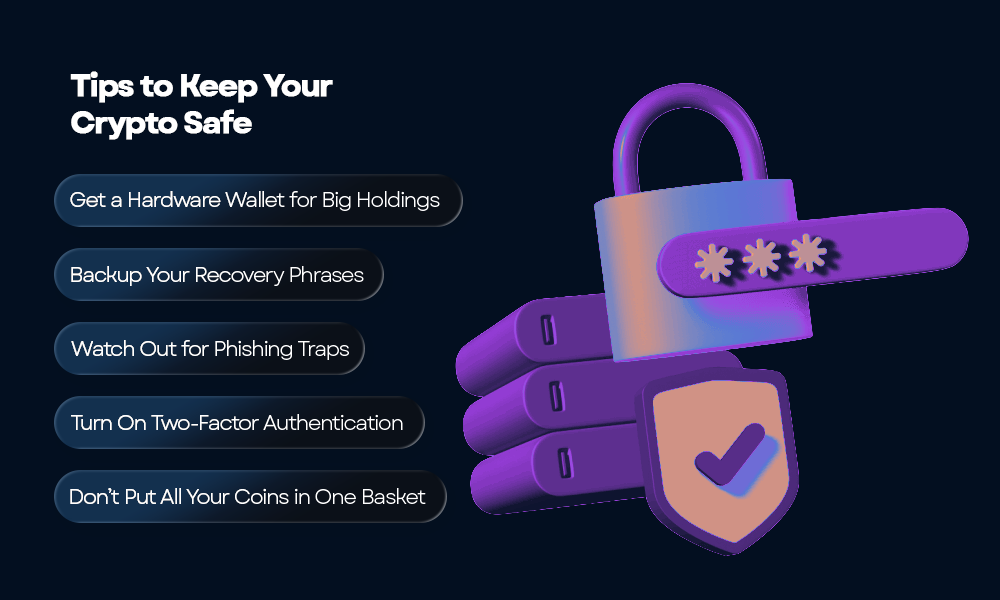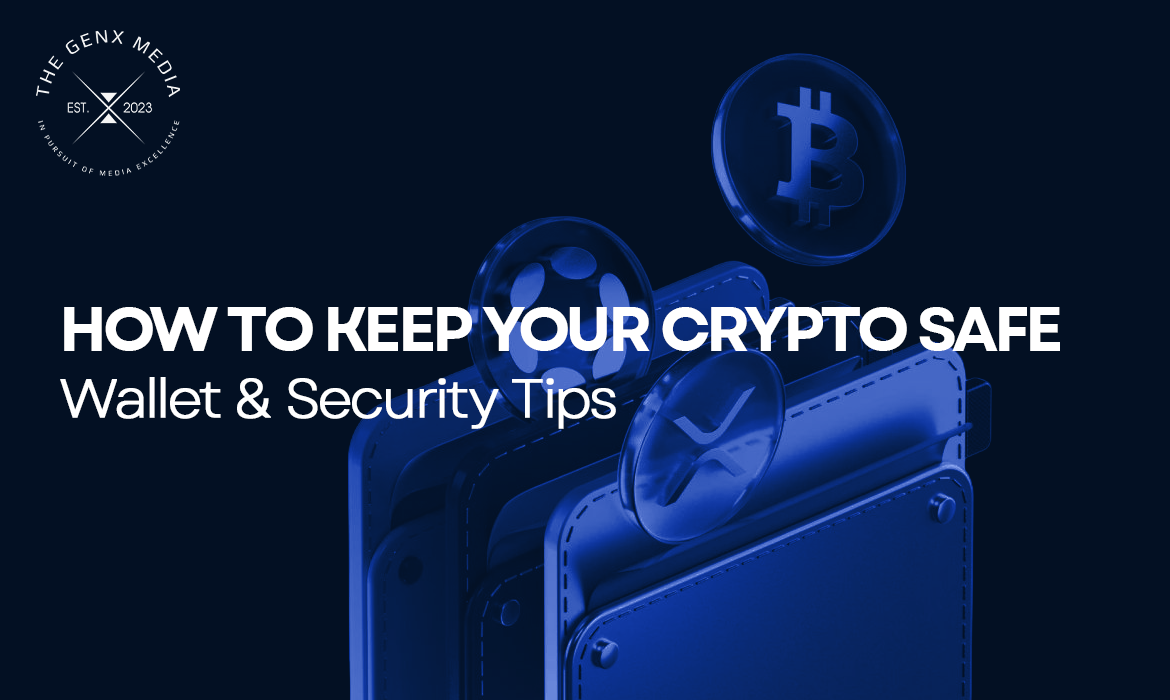So, you finally bought some crypto. Maybe it’s Bitcoin, maybe it’s Ethereum, or maybe you went for one of those new coins your friend swears will “go to the moon.” Either way, congratulations. But here’s the catch: now you’ve got to keep it safe. Unlike your bank account, there’s no “forgot password” button if something goes wrong. Once your coins are gone, they’re gone.
That’s the part a lot of beginners don’t realize until it’s too late. And trust me, you don’t want to learn the hard way. The good news is you don’t need to be a cybersecurity expert to protect your crypto. You just need to follow a few crypto security tips and build smart habits. Let’s break it down.
Why Security Matters in Crypto
Crypto is exciting because it’s decentralized. You don’t need a bank to send money around the world. But that freedom comes with full responsibility. Hackers and scammers love targeting crypto holders, and billions have been lost in scams and hacks over the years.
Think of crypto like cash in your pocket. If you drop a $100 bill, anyone can grab it. Same deal here. Your wallet doesn’t “hold” your coins; it holds the keys that let you move them. If someone else gets those keys, guess what? They own your coins.

The Basics of Crypto Wallets
Before we talk about security tips, let’s quickly clear up what wallets actually are. If you’re just starting, it’s important to understand the difference between hot and cold wallets before choosing the right one for you.
Hot Wallets
Hot wallets are always connected to the internet. Think mobile apps, desktop wallets, or online exchange wallets. They’re easy to use and perfect for everyday transactions. The downside? Being online means they’re a bigger target for hackers.
Cold Wallets
Cold wallets live offline. Hardware wallets (like Ledger or Trezor) and even paper wallets fall into this camp. Since they’re disconnected, they’re much safer against online threats. The tradeoff is that they’re less convenient.
Custodial vs Non-Custodial
If you use a custodial wallet, an exchange or company holds your private keys for you. With a non-custodial wallet, you’re the one in control. The golden rule here is: “Not your keys, not your coins.” If someone else holds your keys, you’re basically trusting them with your money.
Tips to Keep Your Crypto Safe
Alright, here’s the part you came for: “how to keep crypto safe.”

Get a Hardware Wallet for Big Holdings
If you’re sitting on a decent stash, you don’t want to leave it all online. A hardware wallet is like a safe for your coins. It keeps your private keys offline, where hackers can’t touch them. Sure, it takes a couple of extra steps to use, but peace of mind is worth it.
Backup Your Recovery Phrases
When you set up a wallet, you’ll get a seed phrase, usually 12 or 24 random words. That phrase is the master key to everything. Write it down on paper. Don’t screenshot it, don’t save it on Google Drive, don’t email it to yourself. Old-school pen and paper is the way to go. Store it somewhere safe, and if you’re extra cautious, consider a fireproof safe.
Watch Out for Phishing Traps
Phishing scams are sneaky. You might get an email or message that looks exactly like it’s from your exchange, but it’s really a scammer trying to trick you into typing in your details. Always double-check the website URL before logging in. If something feels urgent and pushy, that’s usually a sign to stop and think.
Turn On Two-Factor Authentication
Passwords alone aren’t enough. Enabling 2FA gives you that extra line of defense. Use an authenticator app rather than SMS, since text messages can be hijacked.
Don’t Put All Your Coins in One Basket
Diversify not just your portfolio, but your wallets too. Keep some in a hot wallet for quick access, some in a cold wallet for long-term storage. That way, if one gets compromised, you don’t lose everything.
Building Smart Habits
Protecting your crypto isn’t just about tools. It’s also about how you think and behave.
Slow Down Before You Click
Scammers thrive on panic and excitement. If a pop-up says, “Your account will be closed if you don’t act now,” stop. Take a breath. Go directly to the official website or app and check for yourself.
Double-Check Every Transaction
Once you hit send, there’s no undo button. Check the wallet address carefully. A single wrong character and your money disappears into the void. Many people even send a tiny test transaction before moving large sums.
Keep Learning
Crypto moves fast. Scams change, tools evolve, and new tech shows up every month. Staying up to date is one of your best defenses. Follow reliable news sites, join forums, and keep improving your knowledge about safe crypto storage.
Treat Your Keys Like Treasure
Your private keys are basically your money. Don’t store them in your email, on your phone, or in the cloud. If someone hacks those, it’s game over. Think of your keys like the deed to your house; you wouldn’t leave it lying around.
Mistakes That Put Your Crypto at Risk
Even smart people slip up. Here are some common traps to avoid.

Leaving Everything on Exchanges
Exchanges can be hacked or go under. History has plenty of examples. Keep only what you need for trading on an exchange and move the rest into your own wallet.
Reusing Passwords
We’ve all been guilty of this, but it’s a bad idea. If one account gets hacked, all your accounts are at risk. Use strong, unique passwords, and consider a password manager if it’s hard to keep track.
Ignoring Small Amounts
You might think, “It’s just a few bucks worth of crypto, who cares?” But those small amounts can grow, and scammers will happily take them too. Good habits with small sums set you up to protect larger ones later.
Conclusion
Keeping your crypto safe isn’t about being paranoid. It’s about being responsible. With traditional money, the bank has your back. With crypto, you are the bank. That’s why understanding cryptocurrency wallet security is so important.
By choosing the right wallet, backing up your recovery phrase, staying alert for scams, and practicing smart habits, you massively lower your chances of losing your hard-earned coins.
At the end of the day, crypto isn’t just numbers on a screen. For many people, it represents freedom, financial opportunity, and a shot at something bigger. Treat it like something worth protecting, because it is.
FAQs
Is multi-signature (multi-sig) worth using?
Yes, especially if you’re holding serious amounts of crypto. Multi-sig means more than one approval is needed to move your coins. It’s like having two locks on your safe instead of one.
What is staking in crypto?
Staking is like earning interest on your coins. You lock them up to help secure a blockchain, and in return, you get rewards. Simple, kind of like a savings account, but on the blockchain.
How often should I check my wallets?
For hot wallets, check often since you use them daily. For cold wallets, checking every few months is fine, just to be sure everything’s where it should be.
Can antivirus software protect my crypto?
It helps, yes. Antivirus software can block spyware or keyloggers that try to steal your keys. It’s not bulletproof, but it’s like locking your front door.
Is crypto legal in the UAE?
Yes! You can own and trade crypto in the UAE. Dubai and Abu Dhabi even have clear rules and zones for crypto businesses. Just check local regulations before diving in, since each emirate can be a little different.


